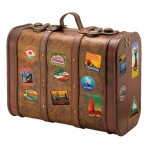Teaching Class While on Travel
 Teaching class while off campus can be a daunting task. Combining face to face classroom methods with computer-mediated activities may be a solution. This approach capitalizes on the best aspects of both face to face and online instruction. Classroom time can be used to engage students in experiences; while online assignments can provide students with multimedia-rich content and discoveries that reinforce materials learned in the classroom.
Teaching class while off campus can be a daunting task. Combining face to face classroom methods with computer-mediated activities may be a solution. This approach capitalizes on the best aspects of both face to face and online instruction. Classroom time can be used to engage students in experiences; while online assignments can provide students with multimedia-rich content and discoveries that reinforce materials learned in the classroom.
Ideas
The list below contains ideas to use while traveling. For more ideas contact Cheri Crabb or Ben McFadyen, with TLT, at 278-5006.
- Note where students can get technical support while you are away
- Develop rubrics for assignments & include in the syllabus along with stellar student examples
- Create a calendar of work to keep students on track
- Use portfolios as a mode of evaluation; the student is assessed by a progressive series of work
- Use web conferencing software to record a lecture or hold class synchronously
- Add your lecture notes to the bottom of the PowerPoint slides
- Include Podcasts lectures
- Integrate audio into the PowerPoint slides
- Videotape a lecture given in a face to face classroom & upload
- Add links to related resources in your PowerPoint
- Create a notebook of lecture notes & have the students download & read it
- Introduce online assignments with a video from you
- Begin each unit with a video, joke, or comic & tie it into the lesson(s)
- Hold online office hours via email, IM, Skype or other
- Use announcements/email for course modifications & discussion board summaries
- Consolidate reference materials in one location (i.e. e-reserves)
- Incorporate reflection/opinion papers weekly to tie points together
- Keep your posts to approximately 30% or less of the total discussion or the students will begin posting to you instead of the class
- Set rules & standards for good netiquette
- Require students to provide substantial posts backed up with class information, readings & resources
- Alternate postings by assigning students to respond every other week; or summarize discussion points
- Set up a discussion board where students can post the murkiest point; monitor & respond daily
- Incorporate external websites links to maintain current & contemporary discussions
- Create mind maps that show connections & relationships with material, or use them as summaries
- Assign groups a different course topic to explore; post in the main discussion area for review & comment
- Assign discussion groups to create a product & post, such as: a quiz for the class, write a response to an author, compose a critique of a reading, brainstorm a topic, create a journal article review, compare & contrast an issue
- Reinforce procedures or processes by asking students to relate it to daily life, or respond to a case study
Recommended readings
Understanding by Design, Expanded 2nd Edition, 2005, Grant Wiggins and Jay McTighe
Building Online Learning Communities, 2007, Rena M. Palloff and Keith Pratt
Effective Online Teaching – Foundations and Strategies for Student Success, 2011, Tina Stavredes
 Follow
Follow
so informative…thanks!
Great article, I’m going to give this one to a friend who teaches and travels a lot! They are all really good tips, cheers.
information is helpful